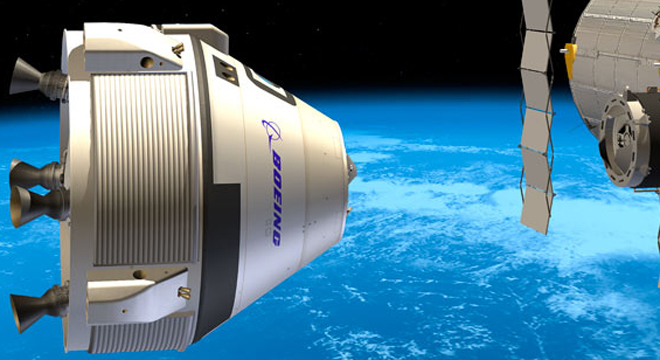Boeing on Monday announced it has struck a deal to lease an old NASA Space Shuttle hangar to build its new commercial crew capsule, CST-100, aiming to create 550 jobs by the time the facility is scheduled to be at full operations in 2015, a minor economic boost to an area that NASA estimates has suffered 4,000 job losses since 2009, when NASA began preparing to retire the space shuttle, according to the Associated Press.
Boeing’s CST-100 is one of several proposed commercial crew spacecraft, or “space taxis,” that NASA is partially financing to replace the Space Shuttle, which flew its final mission in July. The CST-100 is being designed to carry a crew of seven into low-earth orbit, to the International Space Station and a proposed private space station from Bigelow Aerospace. Boeing also anticipates being able to take civilian tourists up into low-earth orbit on the craft no earlier than 2015.
“We plan to manufacture, assemble and launch the CST-100 from right here, on Florida’s space coast,” aid John Mulholland, vice president and program manager of Commercial Programs for Boeing Space Exploration, at an announcement event at NASA’s Kennedy Space Center, which was attended by Senator Bill Nelson (D-FL) and Governor Rick Scott (R-FL).
“We are extremely pleased that Boeing will locate its Commercial Crew headquarters here in Florida,” said Frank DiBello, president of Space Florida, the State’s aerospace economic development agency, in a prepared statement. “This positions our state well for future growth and a leadership role in NASA’s next generation human space exploration initiatives. It is also a key factor in ensuring Florida’s space-related economy continues to thrive after shuttle retirement.”
Indeed, while Florida Governor Rick Scott may not be a fan of high-speed rail (rejecting $2.4 billion in federal stimulus funding for a high-speed rail system in his state in February), he is clearly a strong proponent of government-funded space initiatives in his state.
“We’re very appreciative that Boeing is doing this for Space Florida,” Scott said in a speech at the announcement event. “Today’s announcement shows that Florida has the word class facilites and experience we need.”
Scott also thanked Space Florida officials for “making sure we had the funding we need,” to support NASA’s Commercial Crew Development program (CCDev), a competitive contracts program to outsource the creation of space taxis to private companies.
And yet, in nearly the same breath, Scott not-so subtly criticized the very federal funding that made CCDev possible.
“We understand it is private companies, not the government, that creates jobs,” Scott said in his address.
Boeing has received a total $110 million from the CCDev program, some $92.3 million in April and $18 million back in 2010, when the program began.
Boeing is also no stranger to partnering with NASA. The Chicago-based aerospace company was also the major subcontractor for the Space Shuttle while that program was active from 1981 to 2011.
It’s unclear exactly what the terms of Boeing’s new lease of the hangar are. TPM has reached out to Boeing and Space Florida for more information and will update when we receive a response.
Currently, the only means of transportation for NASA astronauts traveling to the space station is the Russian Soyuz line of capsules, which costs NASA an estimated $450 million a year, according to Florida Today.
They’ve also suffered some technical glitches lately, with an unmanned Soyuz rocket crashing shortly after takeoff in August, sparking fears the space station would have to be temporarily abandoned if the cause wasn’t determined in time to rotate the crew.
Russia just resumed unmanned Soyuz launches on Sunday. The first manned flight since the crash is set for November 14.
America’s own homegrown near-term private spaceflight prospects remain mixed at best.
President Obama’s proposed budget for 2012 includes an $850 million allocation for the commercial crew development program, though that project includes five commercial partners, among them Boeing and Amazon.com-CEO Jeff Bezos’ private space company Blue Origin. All of the companies are competing to replace the Shuttle in ferrying astronauts and crew to and from the International Space Station.
Of course, the 2012 budget has yet to be approved by Congress, and there appears a showdown looming over the proposed funding for NASA and the CCDev program.
That showdown will likely take place the next time Congress is forced to debate the 2012 budget, which must take place before November 18, the expiration date of a continuing resolution Congress passed in early October to keep the government temporarily funded in the absence of a budget agreement.
Meanwhile, a NASA-funded commercial cargo vessel from PayPal founder Elon Musk’s private spaceflight company SpaceX iscurrently being assembled in Florida and is on track to make a test flight to the International Space Station before the end of 2011.






